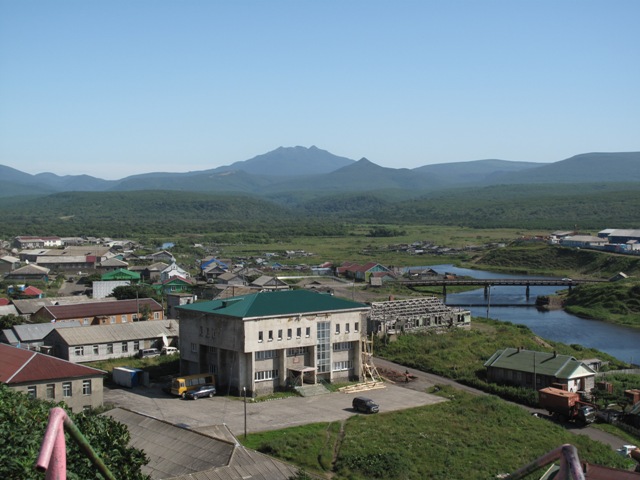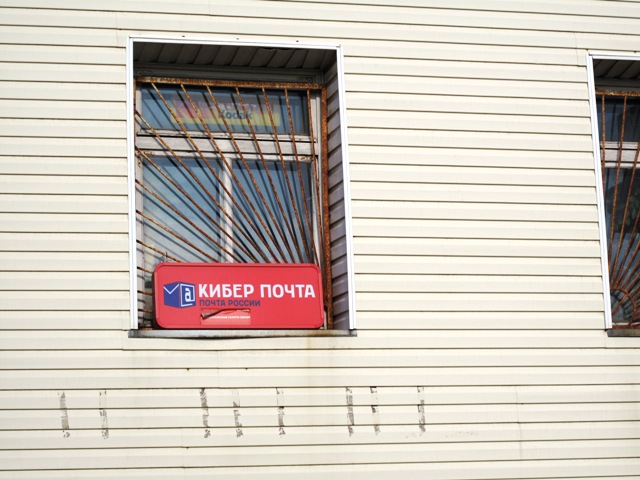
Far from Moscow: Kurilsk city at the Kuril Islands. The Internet here is very expensive and very slow.
The Internet penetration in Russia continues to grow. A report by Gfk Group says [RUS] the number of Russian families that have an access to the Internet significantly increased. Currently, every third Russian family browses the Web. Not surprisingly, Moscow has the biggest Internet penetration rate of 52 percent while the Russian Far East region has the lowest penetration rate of 21 percent. The report also says that 72 percent of Russians reported that the economical crisis had no effect on the level of their Internet usage. Another interesting fact is the increase in the number of Russians who go online via mobile devices. According to the same report, 46 percent of Internet users use their hand-held devices. The majority among those users consists of young people 16-19 years old (81 percent).
According to ACM-Consulting, the number of Runet (Russian Internet) users who have a broadband access in 2009 has raised by 36 percent from 8.3 to 11.3 millions. At the same time, the size of Russian broadband market increased by 60 percents during last year and it is currently estimated at $2.7 billion. According to Russian newspapers “Vedomosty” [RUS], the telecommunication experts predict that in 2010 the broadband market will primarily develop in Russian regions, since ¾ of the families of Moscow Internet users already have broadband access. Consequently, Internet providers will focus more on smaller cities.
The recent International Telecommunication Unit report “The Information Society Statistical Profiles 2009: CIS” [ENG] supports the claim that the Russian Internet grows very fast. According to ITU, there are 45,250,000 Internet users in Russia as of June 2009. That is 32.3 percent of population. The report also explains the nature of a major gap in Russian Internet infrastructure and supports the recent finding of Gfk in regard to the Russian Far East:
In Russia, a substantial digital divide can be observed among the major cities across the country’s regions. For example, the average speed of Internet access in Moscow and St.-Petersburg is about seven Мbps, compared to around 410 kbps in other large cities. This divide affects the price policies of Internet providers, with the cost of Internet services in regional cities largely exceeding that in Moscow and St.-Petersburg.
The high prices for Internet access cause outrage among inhabitants of the Russian Far East. In September 2001, people went to streets [RUS] to express their frustration with the lack of equality in Internet access. Ilya Ignatov, a resident of Yuzhno-Sahalinks and Livejournal blogger Votangi, initiated a public appeal to the President Medevedev and Russian Minister of Communication Igor Schegolev. The appeal called for eliminating unjustified high prices for Internet access. Ignatov published [RUS] the letter on his blog.
The recent attempt to connect the Sakhalin Island to broadband infrastructure – that could significantly decrease the prices – has failed [ENG]. The next attempt is planned for 2011.

"Cyber-mail" service at Kurilsk post office. The only way to access the Web for many local residents.
However, it looks like Russian authorities don’t want to wait untill 2011 and just hope that the next attempt to connect the Island will be successful. The Federal Antimonoply Service (FAS) [ENG] announced on March 4 that it might start the prosecution process against some of local operators of the major Russian telecommunication company “Svyazinvest” [ENG]. The Deputy Head of FAS Anatoliy Golomolzin told [RUS] Russian journalist that his organization already initiated legal proceedings against few Internet providers and some of them received “orders” to reduce the prices and minor fines.
FAS currently works on evaluation of prices for the Internet access on the regional markets of Russia where the price is significantly higher than in Moscow. Golomolzin said [RUS] that FAS intended to make the price for Internet access equal in any place of the country by the end of 2010 and solve the problem of digital divides by mitigating the gap between the center of Russia and its regions.
The announcement of FAS was treated [RUS] with careful excitement by Russian Internet users:
Нде, засудить этот сибирьтелеком! 1100 за мегабит в Хакасии, при 400 рублях за 2 мегабита у того же провайдера в Новосибирске. При этом всём еще и качество связи так себе. Даешь равные условиях для всех пользователей!
А 999 р за 200 килобит у Дальсвязи еще хуже. Притом что и этого не получаешь, магистральный кабель перегружен.
Вот любопытно, если ФАС признает данное нарушение фактом, имею ли я право, как пользователь данной сети, на компенсацию перерасчётом…
Russian efforts to decrease the price of the Internet access might have a strong linkage to defining the development of electronic government as a major priority on the Kremlin’s agenda. Previously, in February 2010, Russian minister of Telecommunication Igor Shegolev asked from “Svyazinvest” to consider establishing low “social prices” in region that are supposed to be around 500 rubles ($16).
The “Svyazinvest” representative complained [RUS] against the position of FAS in interview to RBC Daily:
«Позиция ФАС не очень понятна — государство хочет, чтобы «Связьинвест» был эффективной рыночной компанией, приносящей прибыль своему основному акционеру. Если государство хочет, чтобы мы выполняли социальные функции, это тоже возможно, но надо понимать, как и на каких условиях это будет реализовываться»
Yuriy Bryukvin, a general director analytical agency “Rustelecom” explained [RUS] to RBC that sometimes the high prices are justified because the cost of infrastructure development in distant regions is higher than in the center. At the same time, Brukvin agreed that the decrease of price from 1,000 rubles to 500 rubles per month is an important step that should increase the availability of the Internet. Moreover, Bryukvin argues that it’s not enough and the monthly price of the Internet access should be the same as monthly payment for the phone line – 300 rubles ($10).
Next day after Golomolzin’s conversation with journalists , FAS officially announced [RUS] that it initiated the investigation against “Dalsvyaz” [ENG] since it was suspected in having exaggerated prices as the only provider of the Internet access in many regions in the Russian Far East.
В результате анализа тарифов ОАО «Дальсвязь» ФАС России установила, что тарифы в Камчатском крае превышают тарифы, установленные в Москве и Санкт-Петербурге на 350-1700 %, а в Сахалинской области – превышают тарифы, установленные в других городах Дальневосточного федерального округа на 250%, в Москве и Санкт-Петербурге – 1800-5100 %. (…)
ФАС России полагает, что необоснованное завышение цен на услуги доступа к сети Интернет недопустимо, может ущемлять интересы граждан Российской Федерации, в том числе может препятствовать реализации гражданами своих прав на получение государственных услуг в электронном виде.
FAS of Russia claims that unjustified exaggeration of Internet access prices in not acceptable; it might threaten the interests of Russian citizens including realization of the right to receive governmental services in electronic form.
Ilya Ignatov, the leader of Sakhalin protest, published the letter from FAS in his blog under the title “Good news”. He wrote [RUS]:
Больше всего удивила и в некоторой степени порадовала дата рассмотрения дела 5 апреля, как раз в мой день рождения что ж, очень приятно…








1 comment